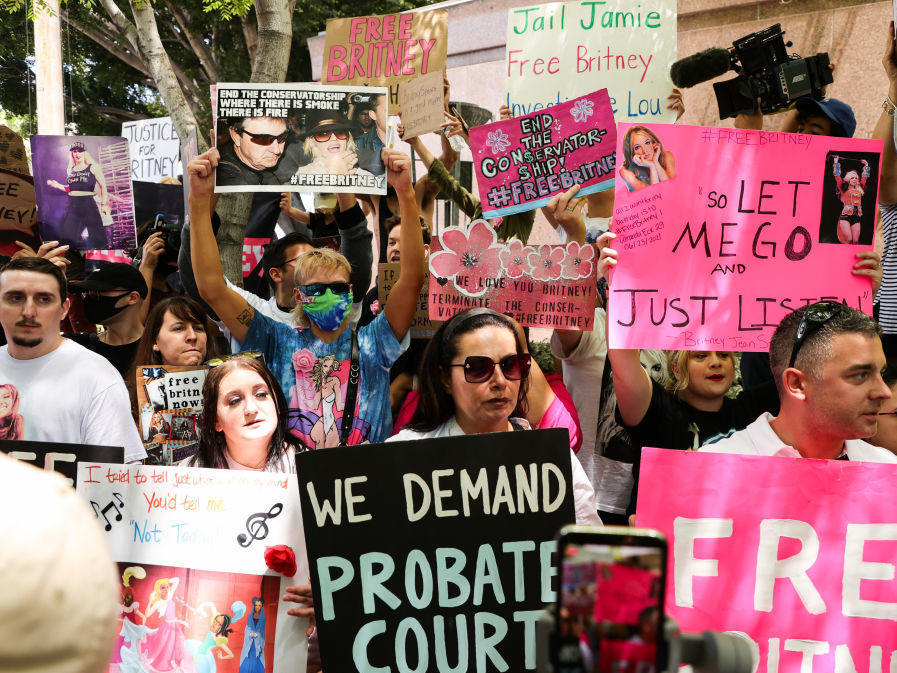a/k/a
The Conservatorship of Britney Spears
Is it only with 20:20 hindsight that through her songs and their titles Britney seemed to be screaming for help? Bright lights and lots of media attention shone on September’s precedent-setting ruling on the conservatorship of Britney Spears. As a result, our collective consciousness of this issue was raised and therefore in our recent blogpost on guardianships (which are related to conservatorships), we laid the groundwork for this blog, focusing more fully on the circumstances and legal machinations of Britney’s case.
However, before saying anything at all about this topic, I want to say that I am not licensed to practice law in California, conservatorships are not my area of expertise, nor am I fully versed in the actions of the California Court that made the rulings. In addition, the Massachusetts and California rules around these issues differ significantly: Massachusetts follows the Uniform Probate Code, and handles guardianships and conservatorships accordingly, while California (where Britney’s legal battle took place) has not adopted the Uniform Probate Code. Therefore, this blogpost is simply meant to be a social commentary on the facts as I’ve viewed them in the mainstream media.
Having practiced law for over 30 years in the state of Massachusetts, and as a family law practitioner, I have and hold multiple perspectives on the dynamics of families in legal contention. It seems to me that Britney’s thirteen-year-long conservatorship by her father was unusual in several ways, and based on seemingly reliable reporters has involved privacy violations and illegal monitoring of his daughter and possibly misappropriation of funds.
Considering the ample funds Britney has earned and her proven ability to work and perform, the fact that she was not allowed to choose her own lawyer raises red flags. Although presumably, from the outset of her temporary conservatorship Britney’s mental health was being called into question, it is entirely unclear why — prior to any permanent judgment having been made — she wasn’t able to hire counsel of her own choosing and was instead constrained by having had a court-appointed lawyer chosen on her behalf.
Furthermore, given the illegal monitoring and restrictions placed on Britney Spears (including spying on her private text exchanges and camera monitoring of her in her bedroom), she may have grounds for further legal actions against her father and others who harmed and/or abused her, such as Black Box (the company providing Ms. Spears’ personal security), and Robin Greenhill (one of her managers). Invasion of her privacy, false imprisonment (when she was institutionalized against her will), and the possible embezzlement of funds come immediately to mind. Additionally, along with restricting Britney’s ability to make personal and financial decisions, she claims that her handlers have stopped her from remarrying or having children (though she has expressed a desire to continue expanding her family).
As there is a strong public policy toward independence, the bar for conservatorships is a high hurdle to clear. Typically, the individual seeking to obtain a conservatorship must demonstrate someone’s inability to handle their finances (and in California, presumably their personhood as well: it is my understanding that California Conservatorships include financial and personal responsibility, in contrast to Massachusetts, where those responsibilities are bifurcated between the roles of Guardian and Conservator).
Although the usual purpose of a conservatorship is “to staunch bleeding” and get protective arms around what’s going on, Britney became embroiled in a thirteen-year conservatorship. At long last, she finally was able to hire legal counsel and have her voice heard. Now, she seems positioned to regain autonomy over her personal and financial freedoms.
Britney’s experience highlights the importance of being forward thinking relative to the legal guardrails we put in place for ourselves: specifically, the importance of having a Health Care Proxy, and establishing a durable Power of Attorney. Executing those documents while one is demonstrably competent allows one to voice their choice of agents, and provides protection in the event of a future happenstance which would render them incapable, incompetent, or unable to voice their choice at that time.

